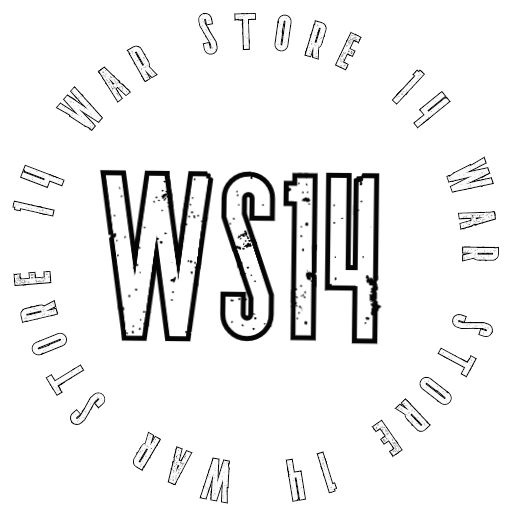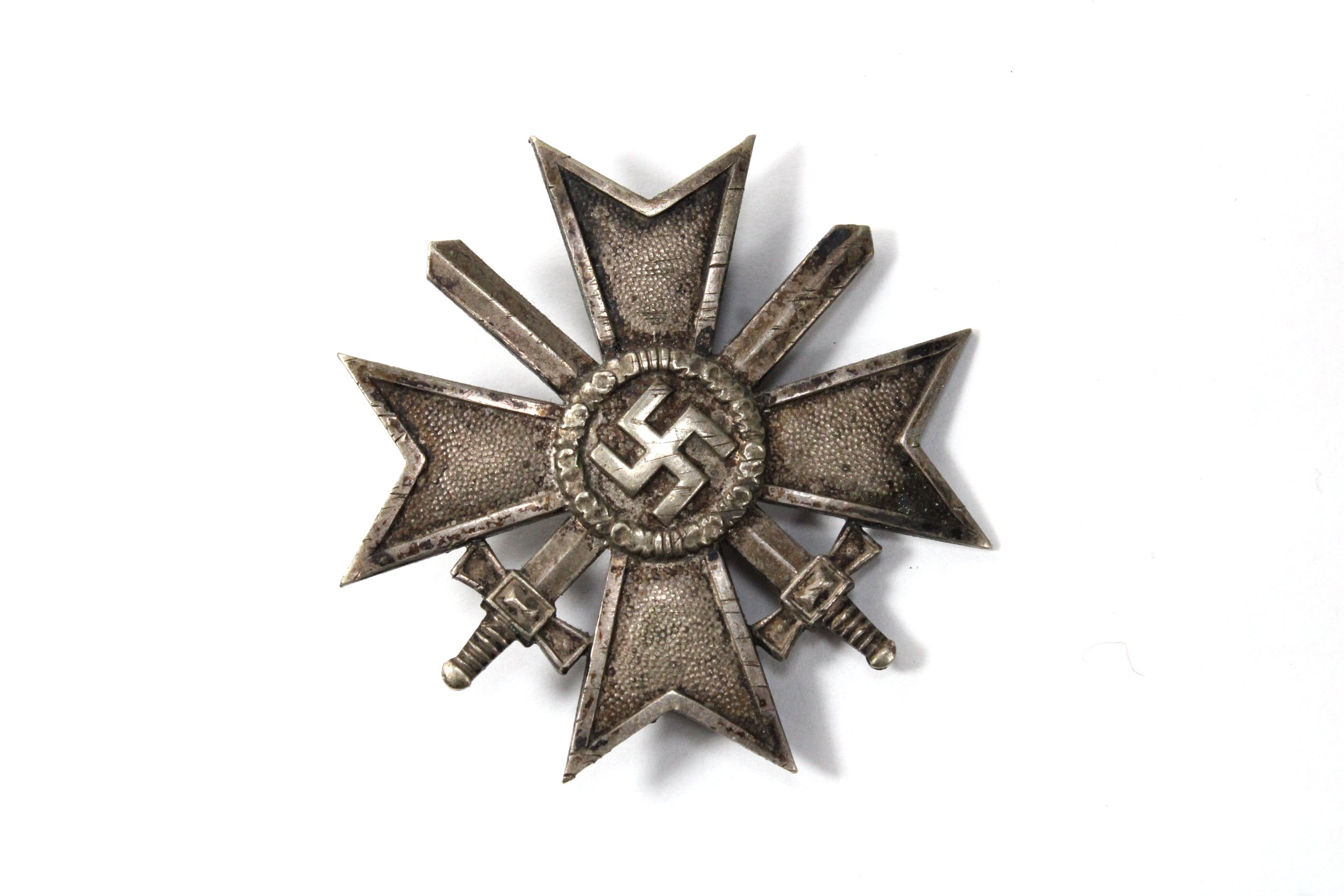Der Mythus des 20. Jahrhunderts, Eine Wertung der seelisch geistigen Gestaltenkämpfe unserer Zeit by Alfred Rosenberg (from the library of Radio Munich) Pamphlet.
108 pages.
Many pages in this pamphlet are underlined or marked and a few notes taken.
The Myth of the 20th Century (German: Der Mythus des zwanzigsten Jahrhunderts) by Alfred Rosenberg, one of the principal ideologues of the Nazi party and editor of the Nazi paper Völkischer Beobachter. It was the most influential Nazi text after Hitler's Mein Kampf. The titular "myth" is "the myth of blood, which under the sign of the swastika unchains the racial world-revolution. It is the awakening of the race soul, which after long sleep victoriously ends the race chaos. In this, his seminal work, Alfred Rosenberg offers the reader a genuine alternative to the political and spiritual attitudes which modern Western society leads us to believe are our only options. From every center of power today we are told that we MUST accept democracy as the only "good" form of government, that we MUST choose either the Judeo-Christian tradition, the New Age movement, or secular humanism as our faith, and that we MUST look to either Adam Smith or Karl Marx for economic wisdom. In "The Myth of the Twentieth Century," Rosenberg takes aim at all of these assumptions and presents us with a worldview entirely different from any of those based upon them--one with its roots deep in those primeval affective, aesthetic, and intellectual inclinations characteristic of the Caucasian race. He argues powerfully for an organic polity as opposed to a Universalist one--most specifically in the Germany of his time--but more generally for Western Civilization as a whole. At the heart of his argument is the provocative thesis that each of the races of the human species possesses a different kind of "soul," which is the origin of human cultural diversity. Environmental influences cannot account for the differences in style and achievement among the races, he argues; the respective environmental conditions under which they have lived have been far too similar to admit of such an explanation. Advancements in the scientific understanding of genetics made since Rosenberg's death, moreover, lend weight to his thesis and make it well worth a thoughtful look. "The Myth of the Twentieth Century" will be of interest to those searching for their identity and its significance amid the anomic trends of contemporary Western life, as well as those looking for a socially relevant philosophy with some depth as an alternative to Establishment prejudices and platitudes.
Alfred Rosenberg (1893-1946) was editor of the Nazi party organ, VÖLKISCHER BEOBACHTER. It was his anti-Semitic, anti-Christian, and neo-pagan book, DER MYTHUS DES 20. JAHRHUNDERTS [The Myth of the Twentieth Century], that supplied Adolf Hitler and the Nazis with a philosophical and pseudo-scientific basis for their racist doctrine. In 1933, Rosenberg was appointed foreign affairs secretary of the party. He became minister for the occupied Eastern territories in 1941. Following conviction at the Nuremberg war crimes trials, Rosenberg was executed in 1946. With the possible exception of Hitler's MEIN KAMPF, Rosenberg's DER MYTHUS DES 20. JAHRHUNDERTS was the book that most influenced the German people in their acceptance of Nazi ideology and doctrine. This copy is from the library of Radio Munich, with two small ink stamps: "Eigentum des Radio München." The association with Radio Munich is important for two reasons: 1) Propaganda minister Joseph Goebbels and the Nazis relied heavily on radio to disseminate their ideology and to build support among the German people. At the time Germany had more radios per capita than any other country in the world, including the USA. 2) Nazi party headquarters was in Munich and Radio Munich was at the epicenter of the Nazi propaganda machine during the Third Reich's early years. In a speech, entitled: The Radio as the Eighth Great Power, given on 18 August 1933, Goebbels said: "Future generations may conclude that the radio had as great an intellectual and spiritual impact on the masses as the printing press… It would not have been possible for us to take power or to use it in the ways we have without the radio... It is no exaggeration to say that the German revolution, at least in the form it took, would have been impossible without... the radio." Hans Fritzsche, a leading Nazi radio broadcaster, wrote: "Without exaggerating, one can say that there is no country in the world where the radio is anywhere near as intensive an intermediary between the government and the people as in Germany." Source: DR. GOEBBELS UND SEIN MINISTERIUM,"
108 pages.
Many pages in this pamphlet are underlined or marked and a few notes taken.
The Myth of the 20th Century (German: Der Mythus des zwanzigsten Jahrhunderts) by Alfred Rosenberg, one of the principal ideologues of the Nazi party and editor of the Nazi paper Völkischer Beobachter. It was the most influential Nazi text after Hitler's Mein Kampf. The titular "myth" is "the myth of blood, which under the sign of the swastika unchains the racial world-revolution. It is the awakening of the race soul, which after long sleep victoriously ends the race chaos. In this, his seminal work, Alfred Rosenberg offers the reader a genuine alternative to the political and spiritual attitudes which modern Western society leads us to believe are our only options. From every center of power today we are told that we MUST accept democracy as the only "good" form of government, that we MUST choose either the Judeo-Christian tradition, the New Age movement, or secular humanism as our faith, and that we MUST look to either Adam Smith or Karl Marx for economic wisdom. In "The Myth of the Twentieth Century," Rosenberg takes aim at all of these assumptions and presents us with a worldview entirely different from any of those based upon them--one with its roots deep in those primeval affective, aesthetic, and intellectual inclinations characteristic of the Caucasian race. He argues powerfully for an organic polity as opposed to a Universalist one--most specifically in the Germany of his time--but more generally for Western Civilization as a whole. At the heart of his argument is the provocative thesis that each of the races of the human species possesses a different kind of "soul," which is the origin of human cultural diversity. Environmental influences cannot account for the differences in style and achievement among the races, he argues; the respective environmental conditions under which they have lived have been far too similar to admit of such an explanation. Advancements in the scientific understanding of genetics made since Rosenberg's death, moreover, lend weight to his thesis and make it well worth a thoughtful look. "The Myth of the Twentieth Century" will be of interest to those searching for their identity and its significance amid the anomic trends of contemporary Western life, as well as those looking for a socially relevant philosophy with some depth as an alternative to Establishment prejudices and platitudes.
Alfred Rosenberg (1893-1946) was editor of the Nazi party organ, VÖLKISCHER BEOBACHTER. It was his anti-Semitic, anti-Christian, and neo-pagan book, DER MYTHUS DES 20. JAHRHUNDERTS [The Myth of the Twentieth Century], that supplied Adolf Hitler and the Nazis with a philosophical and pseudo-scientific basis for their racist doctrine. In 1933, Rosenberg was appointed foreign affairs secretary of the party. He became minister for the occupied Eastern territories in 1941. Following conviction at the Nuremberg war crimes trials, Rosenberg was executed in 1946. With the possible exception of Hitler's MEIN KAMPF, Rosenberg's DER MYTHUS DES 20. JAHRHUNDERTS was the book that most influenced the German people in their acceptance of Nazi ideology and doctrine. This copy is from the library of Radio Munich, with two small ink stamps: "Eigentum des Radio München." The association with Radio Munich is important for two reasons: 1) Propaganda minister Joseph Goebbels and the Nazis relied heavily on radio to disseminate their ideology and to build support among the German people. At the time Germany had more radios per capita than any other country in the world, including the USA. 2) Nazi party headquarters was in Munich and Radio Munich was at the epicenter of the Nazi propaganda machine during the Third Reich's early years. In a speech, entitled: The Radio as the Eighth Great Power, given on 18 August 1933, Goebbels said: "Future generations may conclude that the radio had as great an intellectual and spiritual impact on the masses as the printing press… It would not have been possible for us to take power or to use it in the ways we have without the radio... It is no exaggeration to say that the German revolution, at least in the form it took, would have been impossible without... the radio." Hans Fritzsche, a leading Nazi radio broadcaster, wrote: "Without exaggerating, one can say that there is no country in the world where the radio is anywhere near as intensive an intermediary between the government and the people as in Germany." Source: DR. GOEBBELS UND SEIN MINISTERIUM,"
108 pages.
Many pages in this pamphlet are underlined or marked and a few notes taken.
The Myth of the 20th Century (German: Der Mythus des zwanzigsten Jahrhunderts) by Alfred Rosenberg, one of the principal ideologues of the Nazi party and editor of the Nazi paper Völkischer Beobachter. It was the most influential Nazi text after Hitler's Mein Kampf. The titular "myth" is "the myth of blood, which under the sign of the swastika unchains the racial world-revolution. It is the awakening of the race soul, which after long sleep victoriously ends the race chaos. In this, his seminal work, Alfred Rosenberg offers the reader a genuine alternative to the political and spiritual attitudes which modern Western society leads us to believe are our only options. From every center of power today we are told that we MUST accept democracy as the only "good" form of government, that we MUST choose either the Judeo-Christian tradition, the New Age movement, or secular humanism as our faith, and that we MUST look to either Adam Smith or Karl Marx for economic wisdom. In "The Myth of the Twentieth Century," Rosenberg takes aim at all of these assumptions and presents us with a worldview entirely different from any of those based upon them--one with its roots deep in those primeval affective, aesthetic, and intellectual inclinations characteristic of the Caucasian race. He argues powerfully for an organic polity as opposed to a Universalist one--most specifically in the Germany of his time--but more generally for Western Civilization as a whole. At the heart of his argument is the provocative thesis that each of the races of the human species possesses a different kind of "soul," which is the origin of human cultural diversity. Environmental influences cannot account for the differences in style and achievement among the races, he argues; the respective environmental conditions under which they have lived have been far too similar to admit of such an explanation. Advancements in the scientific understanding of genetics made since Rosenberg's death, moreover, lend weight to his thesis and make it well worth a thoughtful look. "The Myth of the Twentieth Century" will be of interest to those searching for their identity and its significance amid the anomic trends of contemporary Western life, as well as those looking for a socially relevant philosophy with some depth as an alternative to Establishment prejudices and platitudes.
Alfred Rosenberg (1893-1946) was editor of the Nazi party organ, VÖLKISCHER BEOBACHTER. It was his anti-Semitic, anti-Christian, and neo-pagan book, DER MYTHUS DES 20. JAHRHUNDERTS [The Myth of the Twentieth Century], that supplied Adolf Hitler and the Nazis with a philosophical and pseudo-scientific basis for their racist doctrine. In 1933, Rosenberg was appointed foreign affairs secretary of the party. He became minister for the occupied Eastern territories in 1941. Following conviction at the Nuremberg war crimes trials, Rosenberg was executed in 1946. With the possible exception of Hitler's MEIN KAMPF, Rosenberg's DER MYTHUS DES 20. JAHRHUNDERTS was the book that most influenced the German people in their acceptance of Nazi ideology and doctrine. This copy is from the library of Radio Munich, with two small ink stamps: "Eigentum des Radio München." The association with Radio Munich is important for two reasons: 1) Propaganda minister Joseph Goebbels and the Nazis relied heavily on radio to disseminate their ideology and to build support among the German people. At the time Germany had more radios per capita than any other country in the world, including the USA. 2) Nazi party headquarters was in Munich and Radio Munich was at the epicenter of the Nazi propaganda machine during the Third Reich's early years. In a speech, entitled: The Radio as the Eighth Great Power, given on 18 August 1933, Goebbels said: "Future generations may conclude that the radio had as great an intellectual and spiritual impact on the masses as the printing press… It would not have been possible for us to take power or to use it in the ways we have without the radio... It is no exaggeration to say that the German revolution, at least in the form it took, would have been impossible without... the radio." Hans Fritzsche, a leading Nazi radio broadcaster, wrote: "Without exaggerating, one can say that there is no country in the world where the radio is anywhere near as intensive an intermediary between the government and the people as in Germany." Source: DR. GOEBBELS UND SEIN MINISTERIUM,"






















